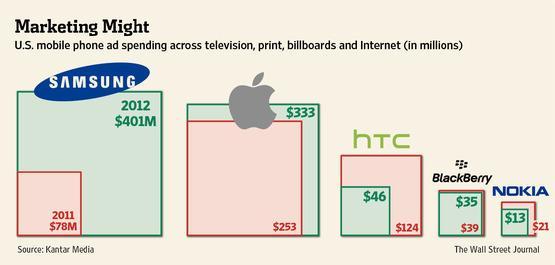When It Comes To Marketing Dollars, Samsung And Apple Dominate…We Feign Surprise
While there’s no question the actual numbers here are interesting on their own, it’s no surprise whatsoever that Samsung and Apple run away from the pack when it comes to marketing dollars. In fact, the most interesting takeaway here is just how much more Samsung and Apple spend against their three largest competitions in HTC, BlackBerry and Nokia. For its part, Samsung leapfrogged Apple in 2012 with spending from $78 million in 2011 to $401 million in 2012. Apple spent $253 million in 2011 and $333 million in 2012. Comparatively, HTC, BlackBerry and Nokia all spent less money in 2012 than in 2011.
These numbers, according to ad research and consulting firm Kantar Media represent part of the reason as to how Samsung has opened up its lead in the smartphone race. Samsung’s willingness to spend big dollars on marketing will likely grow more important as technology gaps close between the competition.
“They understand how to build a strong product…and have been willing to invest to drive their success,” said Michael Sievert, chief marketing officer of T-Mobile USA.
Still, we can’t discount Apple’s own marketing prowess which is often a textbook example for just how successful a company’s marketing campaign can be. However, with Samsung set to introduce the Galaxy S IV tomorrow night, it’s a sure thing that their marketing dollars will rev into high gear in the coming weeks and months. With the closest Android competition unable to match Samsung’s level of marketing investment, they are likely to continue pulling away from the pack.
Fared Adib, senior vice president of product development at Sprint, says Samsung’s marketing strength is now more important because of the focus carriers have on marketing their own services and plans over hardware. With carrier marketing budgets better spent on their own products, that leaves the marketing and promotion up to the device manufacturers, an area Apple and Samsung are likely to continue dominating for the foreseeable future.

